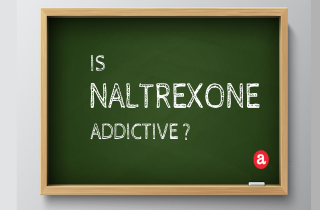No. Naltrexone is not addictive.
Not only is naltrexone non-addictive, it actually helps alcoholics and former drug users in the process of getting sober and staying substance-free. How? Basically, naltrexone blocks the pleasurable effects that alcohol and opiate/opioid drugs (natural and synthetic) produce while simultaneously blocking cravings for these chemicals. So, although fighting addiction isn’t easy, naltrexone can be used as a part of a full addiction treatment program to make the process easier.
More here about the chemical make up of naltrexone and the PRO’s and CON’s of its use. If you have any questions about naltrexone at the end, we invite you to post them in the comments section. We try to answer all legitimate inquiries personally and promptly.
What is naltrexone?
Naltrexone is an opioid antagonist. It has opioid blocking properties and binds mostly in the mu-opioid receptor, but also binds to the kappa opioid receptor and delta opioid receptor. By binding in the opioid receptor sites in the brain, naltrexone blocks alcohol or opioid drug cravings in dependent individuals.
While scientists understand how naltrexone works in the brains of opiate/opioid drug users, the mechanism of action of naltrexone for alcohol dependence is still not fully understood. Nonetheless, it is a proven medication with many benefits for patients who are eligible for treatment.
What is naltrexone used for?
Naltrexone treatment should be a part of a complete addiction management program. Naltrexone works by blocking the chemical responses that make alcohol and opioids rewarding. By acting in such way, naltrexone provides people in recovery with the needed physical support to stay focused on completing a comprehensive recovery program.
People who are highly motivated to work on their addiction recovery can truly benefit from naltrexone, since it helps manage cravings and thus lowers the risk of having a relapse. However, they should completely stop using alcohol or opiate drugs before naltrexone treatment is initiated. Naltrexone is intended for the treatment of:
- Alcohol dependent people who have abstained from alcohol for some time.
- People who are opiate/opioid-dependent but have stopped using illicit or prescription opioid drugs.
Naltrexone for alcohol dependence
Statistics provided by the CDC show that alcohol dependence or alcoholism is among the leading causes of death in the United States. Moreover, alcoholism is listed as No. 3 on the list of lifestyle-related causes of death in the country, with about 79,000 fatalities each year.
If you or a loved one have problems with alcohol, you can seek help from a doctor, who can further refer you to a local treatment program or a detox facility. But, since staying sober is not easy and your brain will still crave it, naltrexone can help with this issue.
Naltrexone for opioid drug dependence
Naltrexone is not a medication that can miraculously cure drug addiction, but it can help recovering addicts stay drug-free. Naltrexone should be prescribed and used as a part of an overall program that may include family or individual counseling, support groups, cognitive-behavioral therapy, educational sessions, lifestyle changes, adequate support system and other treatments that fit patient’s needs.
Deciding to take naltrexone
Naltrexone interferes with the brain’s desire for opioids and alcohol and has been an important aspect of the recovery process for many people. The decision to use naltrexone should be made along with your doctor or counselor, and only after a careful assessment of your physical and mental health state.
We hope the following list of benefits and risks from naltrexone treatment can help you decide whether or not naltrexone is for you:
+PROS
1. Naltrexone reduces alcohol and opiate or opioid drug cravings
2. As a part of structured treatment programs, it can supplement lasting sobriety
3. Decreases the risk of relapse
4. Naltrexone is a safe, supervised method of treatment
5. Naltrexone does not produce euphoria in patients
6. Patients cannot get addicted to or abuse naltrexone
– CONS
1. Naltrexone can only be initiated after all alcohol and opiates are out of the system
2. If taken in larger doses, naltrexone may cause liver injury
3. Not safe for use during pregnancy and nursing
4. There are possible side effects from naltrexone
5. Naltrexone can increase sensitivity to opiates
6. Patients who use naltrexone can overdose on opioids or sustain serious injury
Naltrexone questions
We hope the information we provided in this article can help you in making your decision for naltrexone treatment. But, if you have any questions or uncertainties, feel free to contact us. You can post your comments in the section below and we’ll try to provide a personal and prompt response.









Related Posts